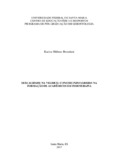| dc.creator | Brondani, Karine Hübner | |
| dc.date.accessioned | 2018-02-08T13:05:59Z | |
| dc.date.available | 2018-02-08T13:05:59Z | |
| dc.date.issued | 2017-08-31 | |
| dc.identifier.uri | http://repositorio.ufsm.br/handle/1/12383 | |
| dc.description.abstract | The aging process produces transformations, changes and adaptations in different aspects of people's lives, among which sexuality stands out. Considering the subject matter is a delicate and difficult to approach, it is essential that it be content in the process of training health professionals. Thus, the objective was to understand how the sexuality in old age is approached in the graduation in Physiotherapy, analyzing what knowledge and attitudes are manifested by the trainees in relation to the theme, pointing out the suggestions for a more humanized professional formation in the health care of Elderly and elderly. For that, a quantitative-qualitative research approach was used, based on data triangulation, carried out in three institutions of higher education and counted on the participation of 60 trainees from Physical Therapy courses. Firstly, the PPCs of the courses were analyzed, followed by the application of the Attitudes and Knowledge Scale on Sexuality in Aging, and after that, focus groups were structured with the students. The results indicate that rarely sexuality and aging are treated as curricular content, when they occupy this position, it is the perspective of the biomedical knowledge that guides the approach of the subject. It is understood that the professionalization process of Physical Therapy is still very marked by the medical hegemony in health and the vision (positive or negative) that the students present regarding the subject sexuality in old age, their behaviors, their experiences, is built in the course of formation. It is also worth noting that the invisibility of the topic raises many doubts, many insecurities and fears of new looks on sexuality and aging. Thus, it is necessary to break prejudices and that the experience of sexuality constitutes a healthy aging, identifying the role of the physiotherapist in the multidisciplinary health team. Although these discussions are still relegated to the shadow zones of Physical Therapy training, it is believed that the results of this dissertation will stimulate adaptation to its courses in order to minimize the taboo of this theme Keywords: Sexuality. Aging. Professional qualification. Curriculum. | eng |
| dc.language | por | por |
| dc.publisher | Universidade Federal de Santa Maria | por |
| dc.rights | Attribution-NonCommercial-NoDerivatives 4.0 International | * |
| dc.rights.uri | http://creativecommons.org/licenses/by-nc-nd/4.0/ | * |
| dc.subject | Sexualidade | por |
| dc.subject | Envelhecimento | por |
| dc.subject | Formação profissional | por |
| dc.subject | Currículo | por |
| dc.subject | Sexuality | eng |
| dc.subject | Aging | eng |
| dc.subject | Professional qualification | eng |
| dc.subject | Curriculum | eng |
| dc.title | Sexualidade na velhice: construindo saberes na formação de acadêmicos em fisioterapia | por |
| dc.title.alternative | Sexuality in velhice: building knowledge in the training of academics in physiotherapy | eng |
| dc.type | Dissertação | por |
| dc.description.resumo | O processo de envelhecimento produz transformações, mudanças e adaptações em diferentes aspectos na vida das pessoas, entre os quais destaca-se a sexualidade. Considerando a temática um assunto delicado e de difícil abordagem, é imprescindível que a mesma seja conteúdo no processo de formação de profissionais da área da saúde. Assim, objetivou-se compreender como a sexualidade na velhice é abordada na graduação em Fisioterapia, analisando que conhecimentos e atitudes são manifestos pelos/as formandos/as em relação ao tema, apontando as sugestões para uma formação profissional mais humanizada na assistência à saúde de idosos e idosas. Para tal, utilizou-se uma abordagem quanti-qualitativa de pesquisa, sustentada na triangulação de dados, realizada em três instituições de ensino superior e contou com a participação de 60 formandos/as dos cursos de Fisioterapia. Primeiramente, foram analisados os PPCs dos cursos, seguida da aplicação da Escala de Atitudes e Conhecimento sobre Sexualidade no Envelhecimento e, após, estruturaram-se grupos focais com os/as estudantes. Os resultados apontam que raramente sexualidade e envelhecimento são tratados como conteúdo curricular, quando ocupam essa posição, é a perspectiva dos saberes biomédicos que orienta a abordagem do tema. Entende-se que o processo de profissionalização da Fisioterapia é ainda muito marcado pela hegemonia médica na saúde e a visão (positiva ou negativa) que os discentes apresentam a respeito da temática sexualidade na velhice, seus comportamentos, suas vivências, é construída no curso de formação. Destaca-se, ainda, que a invisibilidade do tema gera muitas dúvidas, muitas inseguranças e receios de novos olhares sobre sexualidade e envelhecimento. Dessa forma, torna-se necessária a quebra de preconceitos e que a vivência da sexualidade constitua um envelhecimento saudável, identificando o papel do fisioterapeuta na equipe multidisciplinar de saúde. Embora essas discussões ainda sejam relegados às zonas de sombra da formação em Fisioterapia, acredita-se que os resultados desta dissertação irão estimular adaptação aos seus cursos a fim de minimizar o tabu dessa temática. | por |
| dc.contributor.advisor1 | Jaeger, Angelita Alice | |
| dc.contributor.advisor1Lattes | http://lattes.cnpq.br/0333589846842920 | por |
| dc.contributor.referee1 | Andrade, Carmen Maria | |
| dc.contributor.referee1Lattes | http://lattes.cnpq.br/9900184058126807 | por |
| dc.contributor.referee2 | Viana, Helena Brandão | |
| dc.contributor.referee2Lattes | http://lattes.cnpq.br/0493494212541998 | por |
| dc.creator.Lattes | http://lattes.cnpq.br/2181122630701916 | por |
| dc.publisher.country | Brasil | por |
| dc.publisher.department | Educação Física | por |
| dc.publisher.initials | UFSM | por |
| dc.publisher.program | Programa de Pós-Graduação em Gerontologia | por |
| dc.subject.cnpq | CNPQ::CIENCIAS DA SAUDE::EDUCACAO FISICA | por |
| dc.publisher.unidade | Centro de Educação Física e Desportos | por |



